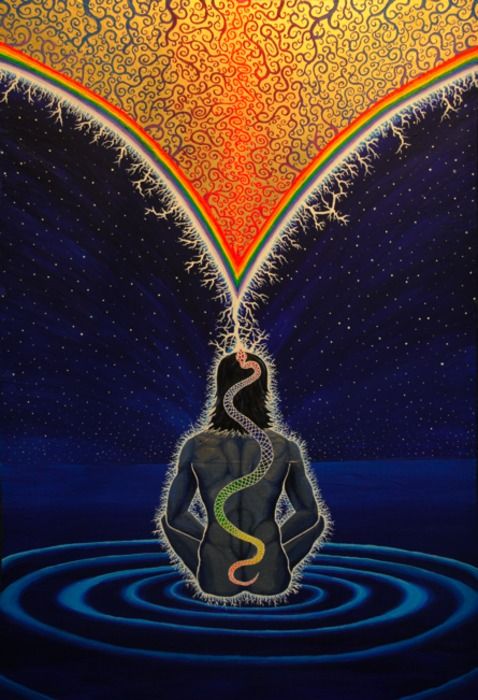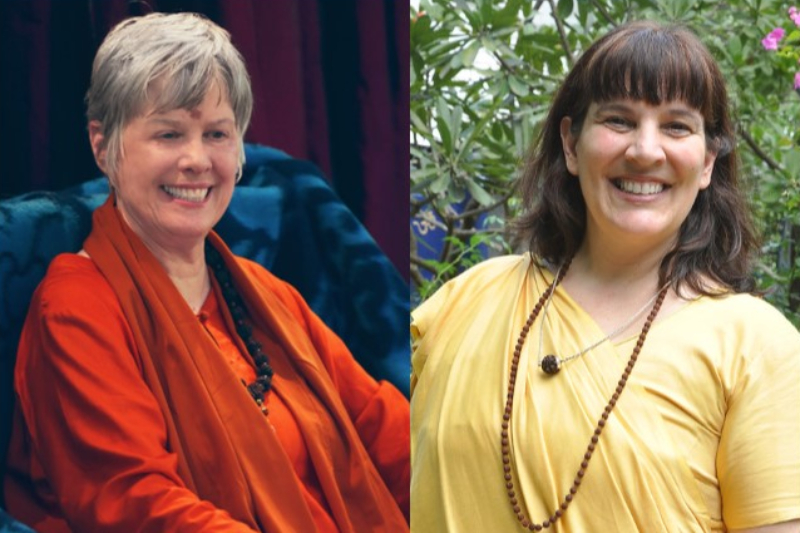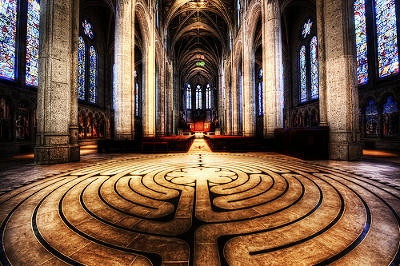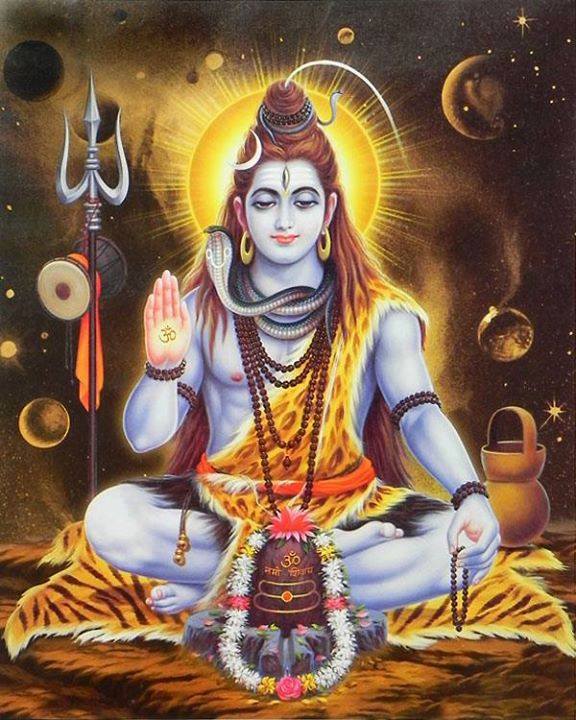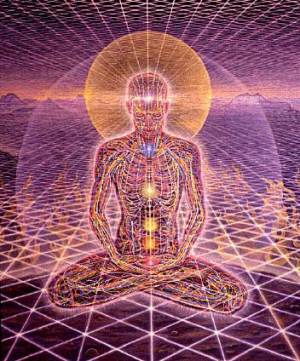 By Nirooshitha Sethuram
By Nirooshitha Sethuram
As soon as the bridge was built, Rama commanded the army to move across the sea to Lankapuri. The troops crossed the sea, reached Lankapuri and made camp at the shore. Ravana sent two spies to gather information about the army. They turned themselves into monkeys and roamed around the camp. Vibhishana identified them as rakshasas and started punishing them. Rama intervened and released them, instructing them to carry the message about the strong and aggressive army to Ravana. When the two spies returned, they described the monkey army and its strength, but it still didn’t change Ravana’s mind. The mandate was sent to Ravana’s commanders to roundup the troops for battle.
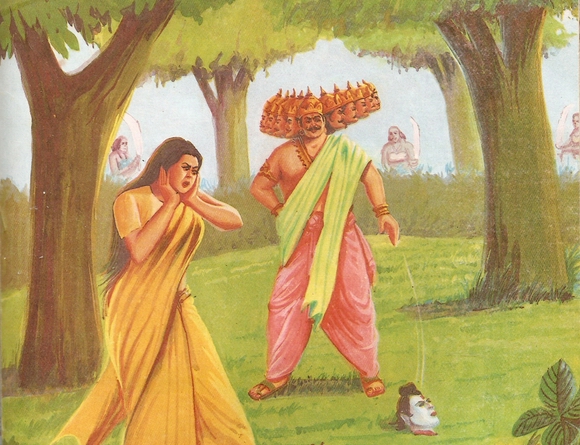 As Ravana’s troops were getting ready for the war, Ravana played one of his tricks on Sita, to persuade her to marry him as a last try. He brought the severed head of a person resembling Rama, saying Sita’s husband is dead and that the only way left for her now is to marry him. At first Sita fell, trembling, on the ground. When she regained consciousness, she asked Ravana to behead her so she can join her husband. At that moment a messenger arrived, bringing Ravana word from the chief of his army. Ravana left in haste and the head of Rama disappeared, revealing to Sita that it was a yet another trick by Ravana.
As Ravana’s troops were getting ready for the war, Ravana played one of his tricks on Sita, to persuade her to marry him as a last try. He brought the severed head of a person resembling Rama, saying Sita’s husband is dead and that the only way left for her now is to marry him. At first Sita fell, trembling, on the ground. When she regained consciousness, she asked Ravana to behead her so she can join her husband. At that moment a messenger arrived, bringing Ravana word from the chief of his army. Ravana left in haste and the head of Rama disappeared, revealing to Sita that it was a yet another trick by Ravana.
Ravana left Sita at the news that Rama had reached Suvela Mountain. Rama and others went to the top of Suvela Mountain, from where they could see the city of Lankapuri. Ravana stood there, above a gateway to the city. Seeing him, Sugreeva sprung into action, leaping on top of Ravana. They dueled for a long time. Finally, after reducing Ravana to exhaustion, Sugreeva stole his crown and came back to Rama.
Rama wanted to give a chance for Ravana to make peace so he sent Angada as a messenger. At the palace, Ravana asked Angada who he is. Angada replied, “I have seen you once before, when I was a baby. One day, when my father was doing his daily pujas to all the eight directions, you followed him around due to curiosity. Annoyed by your constant interruptions, with one blow he brought you down and tied you up in his tail so he could finish his pujas. Afterward, forgetting that you were helplessly tied to his tail, he visited me at my crib side. To stop my crying, he shook his tail and realized you were tied to it like a toy. Looking at this, I stopped crying, amused by your pathetic state. I am sure you remember my mighty father, Vali, with whose power I stand here, his son Angada.”
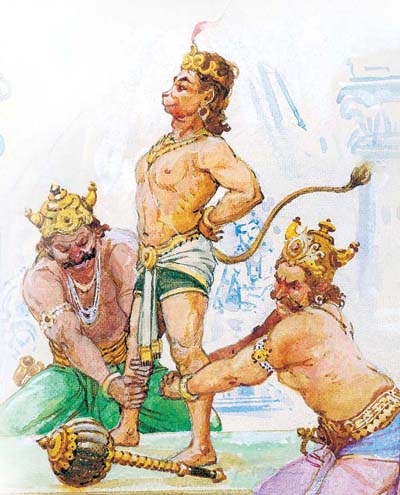 Embarrassed by this, Ravana replied, “I will die before making peace with my enemy.” Angada tried his best to convince Ravana to settle it all in a peaceful manner, but Ravana was firm about going battle instead of conceding defeat. Angada then firmly planted his foot on the ground, challenging anyone in Ravana’s court to uproot his foot. If they could, Rama would admit defeat and return home.
Embarrassed by this, Ravana replied, “I will die before making peace with my enemy.” Angada tried his best to convince Ravana to settle it all in a peaceful manner, but Ravana was firm about going battle instead of conceding defeat. Angada then firmly planted his foot on the ground, challenging anyone in Ravana’s court to uproot his foot. If they could, Rama would admit defeat and return home.
All the mighty Rakshasa commanders, including the mighty Meghanada (Ravana’s son, also called Indrajit) tried their best to uproot Angada’s foot but none succeeded. Angada warned Ravana, that this was his last chance to save himself and his kingdom. Ravana ordered him seized, but Angada jumped to the ceiling and escaped. Angada returned to Rama, giving him Ravana’s refusal to make peace.
So, the inevitable war began. Ravana led his army himself on the first day of battle. The battle was fierce, but at the end of the day Ravana’s army was destroyed and Ravana stood in the middle without his chariot or his weapons. Rama said to Ravana, “It is not right to kill someone who has no weapons to defend himself. I give you time, to think. Go back today and come tomorrow if you still feel that you must go to war.” The disgraced Ravana returned home. Even after his defeat, he didn’t give up on his lust and greed.
The next day Kumbhakarna was awake, disturbed from his six months of sleep, with diminished powers. He had been informed what had happened and tried his best to bring his brother Ravana to his senses, but was not successful. Even after Ravana’s ill words against him, Kumbhakarna decided to fight for his brother, for family’s sake, unlike his other brother, Vibhishana. Yet Kumbhakarna knew he was not on the side of righteousness. He gathered the troops and marched to war on the second day.
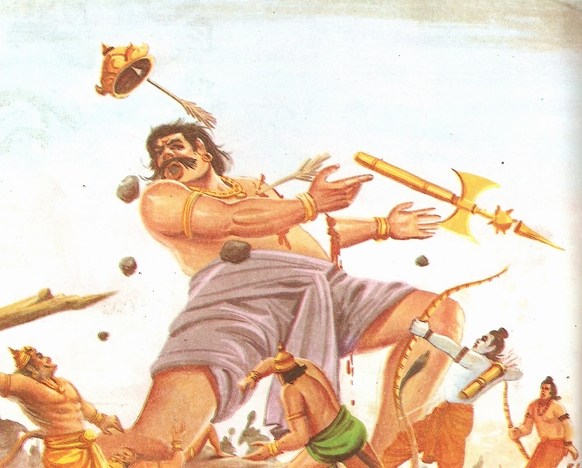 Kumbhakarna did his best, but with his diminished ability and strength, was in no way a match for Rama. By the end of the day, Rama killed Kumbhakarna, freeing the gatekeeper Vijaya from his second life on earth, leaving only one more to go before he reaches the gates of Vaikuntha again. Over the next couple of days, Ravana’s younger sons went to battle, encountering the same result as their uncle.
Kumbhakarna did his best, but with his diminished ability and strength, was in no way a match for Rama. By the end of the day, Rama killed Kumbhakarna, freeing the gatekeeper Vijaya from his second life on earth, leaving only one more to go before he reaches the gates of Vaikuntha again. Over the next couple of days, Ravana’s younger sons went to battle, encountering the same result as their uncle.
Ravana went into unbearable pain due the demise of his brother and sons. Seeing his father’s grief, the powerful Meghanada, Ravana’s eldest son, went into battle. Meghanada had a lot of astras (energetic weapons) from boons he’d received due to his long austerities and worship. He fought valiantly for days. He first bound everyone on the enemy’s side with his Naga-astra (cobra astra), making all of them faint. Garuda (Lord Vishnu’s eagle mount) came in to break the bindings.
Meghanada then wounded Lakshmana with one of his arrows. Hanuman flew off and brought the physician Sushena to cure him. Then Meghanada used his Brahma-astra (Brahma’s astra) to disable everyone except Hanuman, who flew to the Himalayas to bring back the hill with the “Sanjeevani” herb to cure everyone. Having failed to defeat Rama’s monkey army with his astras, Meghanada went into a secret place to perform a yaj~na to get more powers. Finding out about this, Vibhishana helped Rama to find Meghanada. Lakshmana battled with him, killing Meghanada after a fierce fight.
Ravana lost his senses when he heard that his eldest son had perished. Yet, even after all this, Ravana didn’t want to concede defeat. He gathered all the Asuras who were alive and led them into battle. At first he was fighting with ferocity, annihilating the monkey army by firing arrows with his twenty hands. Using magic, he replicated himself, confusing the monkey army. Ravana seemed to be unconquerable; though Rama cut off one of his heads several times, another took its place as soon as one head rolled off.
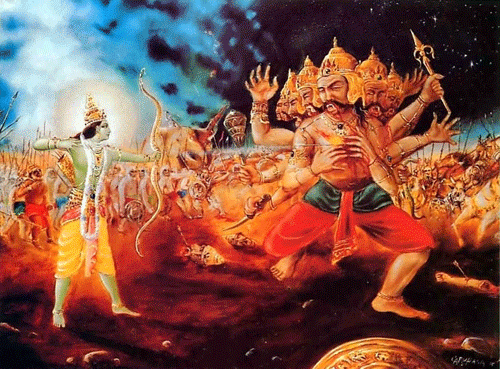 With the battle seeming like it would go on forever, Vibhishana revealed the secret that Ravana’s nectar of life was stored in his navel. At the end of the war’s eighteenth day, Rama killed Ravana by firing arrows at his navel, his heads and his hands at the same time. Thus, Jaya finished his second birth on earth, joining his brother Vijaya.
With the battle seeming like it would go on forever, Vibhishana revealed the secret that Ravana’s nectar of life was stored in his navel. At the end of the war’s eighteenth day, Rama killed Ravana by firing arrows at his navel, his heads and his hands at the same time. Thus, Jaya finished his second birth on earth, joining his brother Vijaya.
Vibhishana went into unbearable grief due to his brother’s death, and performed all the last rights for his brother. Ravana’s wife Mandodari sacrificed herself on the funeral pyre.
Rama crowned Vibhishana as the King of Lankapuri. Then Vibhishana released Sita from the palace’s forest garden, Asoka Vatika. According to Rama’s request, Sita took the test of fire to prove her chastity to the world. Then Rama performed a penance at Setu Beach, a ceremony to Lord Shiva, for being the cause of countless lives lost in the war.
Rama, Sita, Lakshmana and Hanuman started their voyage to Ayodhya, just as the fourteen-year exile was nearing its end. On the way back, they stopped at Kishkinda and the sage Bharadwaja’s hermitage. Rama’s brother Bharata received Rama with the greatest joy. Ayodhya was exuberant due to the return of their beloved Rama. Vasishta and the other priests crowned Rama as King of Ayodhya. Rama ruled Ayodhya in a righteousness manner, a golden time period called “Rama Rajya.”
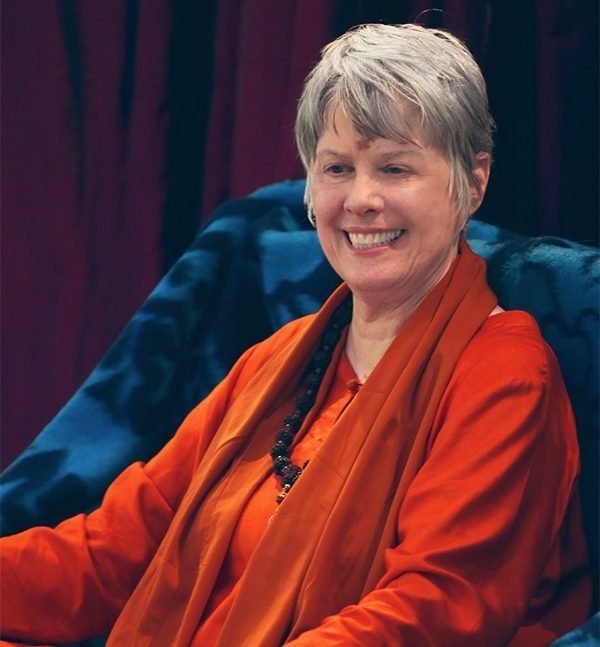 Spying on God
Spying on God
By Sadguru Swami Nirmalananda Saraswati
Rama returned to Ayodhya one day early, before the 14 years was complete. He refused to enter until his vow was complete, so he and all his party camped outside the city walls. The sage Narada came for the great events along with many others who were awaiting the auspicious morning.
In the wee hours, well before the sunrise, Narada began to wonder, “Who does Rama worship? Maybe I can go spy on him!” Creeping quietly through the dark campground, Narada positioned himself outside Rama’s tent. He saw the flickering light of a flame and heard soft chanting and a bell, so he peeked through a slit in the canvas. Ah! Rama was worshipping Shiva! Narada thought, “This proves it; Shiva must be the highest God!
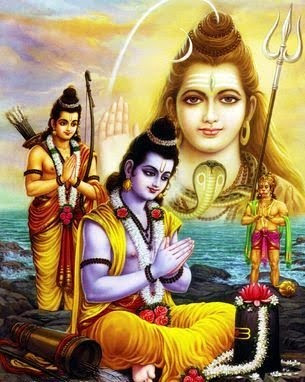 But then Narada thought again, for Shiva was there in the camp as well, incarnated as Hanuman. Creeping through the dark, Narada approached Hanuman’s tent. Again he saw flickering light and heard soft chanting. Peeking through the flap, Narada saw Hanuman worshipping Vishnu, who had incarnated as Rama!
But then Narada thought again, for Shiva was there in the camp as well, incarnated as Hanuman. Creeping through the dark, Narada approached Hanuman’s tent. Again he saw flickering light and heard soft chanting. Peeking through the flap, Narada saw Hanuman worshipping Vishnu, who had incarnated as Rama!
Thus Narada, the great devotee, was confused. Who is the highest God? Vishnu has incarnated as Rama, and is worshipping Shiva, but Shiva has incarnated as Hanuman and is worshipping Rama. The answer is found in the greatest mystery of all — there is only One. That One is found within.
 By Swami Nirmalananda Saraswati
By Swami Nirmalananda Saraswati Practitioners of Svaroopa® yoga’s core opening poses already know the early levels of samadhi, found so easily in the seated poses and twists, and especially in your many Shavasanas. To excavate more deeply within, all the way to your inner Divinity, you have to sit up. All your spinal release has prepared you for an easy seated pose, so the meditative energy (Kundalini) can climb your spine.
Practitioners of Svaroopa® yoga’s core opening poses already know the early levels of samadhi, found so easily in the seated poses and twists, and especially in your many Shavasanas. To excavate more deeply within, all the way to your inner Divinity, you have to sit up. All your spinal release has prepared you for an easy seated pose, so the meditative energy (Kundalini) can climb your spine.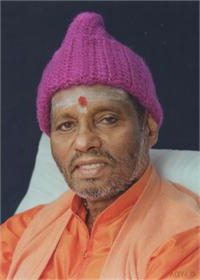 This sutra is saying that there are yogis who are capable of giving enlightenment to others! What kind of amazing gift is that? Personally, this is what got me into yoga and kept me so focused for so long. Having met such a yogi, my own Guru, I knew I was being given a gift beyond comparison — Grace. I wanted it. I knew yoga’s promise was true because I tasted it again and again; samadhi is a taste of enlightenment. I dedicated my life to finding all that yoga promises.
This sutra is saying that there are yogis who are capable of giving enlightenment to others! What kind of amazing gift is that? Personally, this is what got me into yoga and kept me so focused for so long. Having met such a yogi, my own Guru, I knew I was being given a gift beyond comparison — Grace. I wanted it. I knew yoga’s promise was true because I tasted it again and again; samadhi is a taste of enlightenment. I dedicated my life to finding all that yoga promises.









